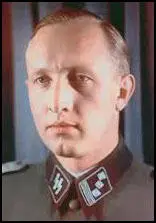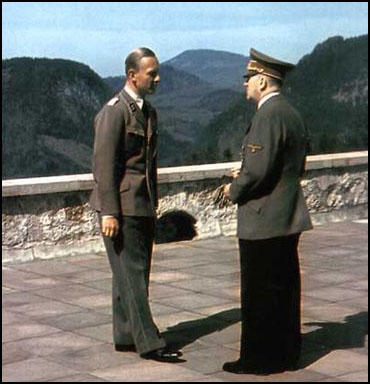Fritz Darges

Fritz Darges was born in Dülseberg on 8th February 1913. He worked as an export clerk and joined the Schutzstaffel (SS) in April 1933. The following year he was selected for officer training and attended the SS-Junkerschule at Bad Tölz.
Darges claims that he first met Adolf Hitler in 1934: "I first met the Führer at the Nuremberg party rally in 1934... He had a sympathetic look, he was warm-hearted. I rated him from the off."
In April 1935 Darges was promoted to Untersturmführer (Second Lieutenant). In 1936 Darges became Adjutant to Martin Bormann. In May 1937 he joined the National Socialist German Workers Party (NSDAP), and in September of that same year he was promoted to Obersturmführer (First Lieutenant).
A member of the Waffen SS he took part in the invasion of France and in July 1940 was awarded the Iron Cross 2nd class and promoted to Hauptsturmführer (Captain). Darges also took part in Operation Barbarossa and was awarded the Iron Cross 1st class in August 1942. In March 1943 he became Adjutant to Adolf Hitler and was promoted to Obersturmbannführer (Lieutenant Colonel) in January 1944.
Darges spent most of the time at Hitler's eastern headquarters the Wolf's Lair at Rastenburg or at his holiday home, the Berghof, on a mountain in Berchtesgaden. Hitler's secretary, Traudl Junge, knew Darges during this period and argues that he worked closely with Otto Günsche: "The people who had most work to do were the young SS adjutants Fritz Darges and Otto Günsche. They had to organize the journey, getting the vehicles ready, telling everyone what to do, fixing the train's itinerary and time of departure, giving instructions to those who were staving behind. Everything had to be done as fast and in as much secrecy as possible. The telephones were in constant use: the administrators at the Berghof had to be told when we were arriving, the Fuhrer's apartment in Munich had to be prepared for him, and not least the special train, even though it was always kept near Hitler and ready to leave, had to be prepared for a long journey carrying many passengers."
Darges later recalled: "It was a very familial atmosphere at the Berghof. One time we went off to Italy together with Eva Braun and her sister Gretel in an open-topped car.... As adjutant I was responsible for his day-to-day programme. I must, and was, always there for him, at every conference, at every inter-service liaison meeting, at all war conferences. I must say I found him a genius."
Nerin E. Gun, the author of Eva Braun: Hitler's Mistress (1969) claims that Adolf Hitler tried to arrange for Darges to marry Gretl Braun. Hitler's secretary, Traudl Junge, has pointed out in To The Last Hour: Hitler's Last Secretary (2002): "Gretl Braun was in love with Fritz Darges too, but a love affair with her was a little too dangerous and not private enough for young Fritz, so he hadn't been able to make up his mind." Gretl, the sister of Eva Braun, also fell in love with Walter Hewell but after being rejected by him she married Hermann Fegelein.

According to an interview he gave later in life to the historian, David Irving, Darges made a serious error of judgement during a conference on 18th July 1944. Irving takes up the story: "A fly began buzzing around the famous conference hut - destined to be wrecked just two days later by an assassin's bomb. It landed on Hitler's shoulder several times, as he stooped over the battle maps, and he irritably squatted at it and missed, while his adjutants began to snicker. Called upon to dispatch the insect, Darges misjudged the mood and suggested that as it was an airborne pest, the job should go to the Luftwaffe adjutant, Nicolas von Below. Hitler dismissed Darges on the spot and he was banished to the Eastern Front."
In August 1944 Darges replaced Johannes Mühlenkamp as the commander of the 5th SS Panzer Regiment. He won the Knight's Cross for his defence of Berlin against the Red Army in January 1945. It is claimed that during this time his regiment destroyed more than thirty Soviet tanks. Darges was eventually captured but was not charged with committing war crimes.
Fritz Darges died on 25th October 2009. Allan Hall wrote in The Daily Telegraph: "Fritz Darges died at the weekend aged 96 with instructions for his manuscript about his time spent at the side of the Führer to be published once he was gone. Darges was the last surviving member of Hitler's inner circle and was present for all major conferences, social engagements and policy announcements for four years of the war. Experts say his account of his time as Hitler's direct link to the SS could discount the claims of revisionists who have tried to claim the German leader knew nothing of the extermination programme. Right-wing historians have claimed the planning for the murder of six million Jews was carried out by SS chief Heinrich Himmler."
Primary Sources
(1) Nerin E. Gun, Eva Braun: Hitler's Mistress (1969)
Gretl, with her giddy temperament, was not over-particular in the matter of men. The photographs in her sister's albums show her with a hundred different boys, and it seems that she rarely refused a flirtation. She even fell in love with an American diplomat. Hitler had originally wanted to marry her to Heinz Hoffmann, the photographer's son, but had not succeeded. Hoffmann himself, because of his increasing drunkenness, had been banished from the `court'. Then Hitler's choice fell on another SS officer of his entourage, Fritz Darges, but he showed himself recalcitrant. Hitler, furious, packed him off to the Russian front. The next candidate was Walter von Hewel. He was a remarkable man who long enjoyed Hitler's confidence and who seems to have been perhaps the only disinterested and loyal member of his entourage. He had fought at his side in the Munich putsch and shared his captivity in Landsberg prison. He was an excellent diplomat ("One has to be," he used to say, "to become an intermediary between Hitler and Ribbentrop") and kept Hitler informed about foreign politics. His diplomatic instincts, however, seem to have warned him against a union with Gretl. He married somebody else and committed the unpardonable sin of not inviting Eva Braun to the wedding. This blunder and other intrigues incurred the wrath of Hitler, who banished him for a long time from his presence.
(2) Traudl Junge, To The Last Hour: Hitler's Last Secretary (2002)
The people who had most work to do were the young SS adjutants Fritz Darges and Otto Günsche. They had to organize the journey, getting the vehicles ready, telling everyone what to do, fixing the train's itinerary and time of departure, giving instructions to those who were staving behind. Everything had to be done as fast and in as much secrecy as possible. The telephones were in constant use: the administrators at the Berghof had to be told when we were arriving, the Fuhrer's apartment in Munich had to be prepared for him, and not least the special train, even though it was always kept near Hitler and ready to leave, had to be prepared for a long journey carrying many passengers...
Gretl Braun was in love with Fritz Darges too, but a love affair with her was a little too dangerous and not private enough for young Fritz, so he hadn't been able to make up his mind.
(3) Allan Hall, The Daily Telegraph (30th October 2009)
Fritz Darges died at the weekend aged 96 with instructions for his manuscript about his time spent at the side of the Führer to be published once he was gone.
Darges was the last surviving member of Hitler's inner circle and was present for all major conferences, social engagements and policy announcements for four years of the war.
Experts say his account of his time as Hitler's direct link to the SS could discount the claims of revisionists who have tried to claim the German leader knew nothing of the extermination programme. Right-wing historians have claimed the planning for the murder of six million Jews was carried out by SS chief Heinrich Himmler.
Mainstream historians believe it inconceivable that Hitler did not issue verbal directives about the mass killings in Darges' presence. Other courtiers, such as armaments minister Albert Speer and propaganda chief Josef Goebbels, had their diaries published post war with no reference to hearing Hitler ordering the "Final Solution".
Darges died on Saturday still believing in the man who engineered the Jewish Holocaust as "the greatest who ever lived." His memoirs will be published now in accordance with his will.
Darges trained as an export clerk but joined the SS in April 1933. His zeal for National Socialism soon earmarked him for great things and by 1936 he was the senior adjutant to Martin Bormann, Hitler's all-powerful secretary.
"I first met the Führer at the Nuremberg party rally in 1934," he said in an interview given to a German newspaper shortly before his death at his home in Celle. "He had a sympathetic look, he was warm-hearted. I rated him from the off."
After serving in the SS panzer division Wiking in France and Russia he was promoted on to the Führer's personal staff in 1940. He rose to the rank of Lt. Col. and was awarded the Knights Cross, the highest gallantry award for bravery in the field.
Much of his time after 1942 was either spent at Hitler's eastern headquarters the Wolf's Lair at Rastenburg, East Prussia, or at his holiday home, the Berghof, on a mountain in Berchtesgaden, Bavaria.
"It was a very familial atmosphere at the Berghof," he recalled. "One time we went off to Italy together with Eva Braun and her sister Gretel in an open-topped car.
"I had to organise all the finances. I had the feeling that Eva's sister was interested in me but I didn't think I should become the brother-in-law of the Führer.
"As adjutant I was responsible for his day-to-day programme. I must, and was, always there for him, at every conference, at every inter-service liaison meeting, at all war conferences.
"I must say I found him a genius."
But Darges misjudged the "warm-hearted" Führer deeply during one conference at Rastenburg on July 18 1944 – two days before a bomb plot nearly succeeded in killing him.
During a strategy conference a fly began buzzing around the room, landing on Hitler's shoulder and on the surface of a map several times.
Irritated, Hitler ordered Darges to "dispatch the nuisance". Darges suggested whimsically that, as it was an "airborne pest" the job should go to the Luftwaffe adjutant, Nicolaus von Below.
Enraged, Hitler dismissed Darges on the spot. "You're for the eastern front!" he yelled. And so he was sent into combat.
But despite the dramatic end to his time with Hitler, he would still hear nothing against "the boss."
"We all dreamed of a greater German empire," he said. "That is why I served him and would do it all again now," said the man who had a career after the war selling cars.
